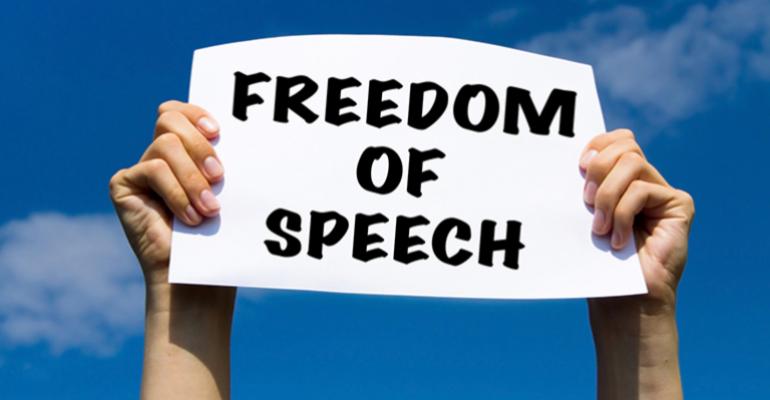Tom, Dick and Harry live on an island with a population of three. Tom and Dick disagree with one another on matters of free speech. I’ll get to that. Harry is a police officer, and his only job is to enforce the logical consequences of Tom and Dick’s respective beliefs. On this strange island there can be no contradictions. Thanks to Officer Harry’s enforcement services, what one believes to be true will inevitably lead to the logical consequences of that belief – unlike the rest of Planet Earth, where it is possible to endlessly change word meanings (‘concept creep’) or just change the subject when someone points out holes in our arguments.
The disagreement between Tom and Dick is the following:
Tom says that people that say appalling things should be sent to jail. Dick finds it appalling that Tom said that people who say appalling things should be sent to jail. Dick believes in free speech – even for the freedom to say things that he finds appalling, so although Dick is appalled at Tom’s statement, he doesn’t want Tom to go to jail. But Officer Harry knows that Dick was appalled by Tom’s statement that people who say appalling things should be sent to jail. Given that Officer Harry’s only job is to enforce the logical consequences of Tom and Dick’s own respective beliefs, he arrests Tom and puts him into jail. To be clear, Officer Harry isn’t arresting Tom because Dick is appalled by Tom’s statement. Officer Harry is arresting Tom because Officer Harry’s only job is to enforce the logical consequences of Tom and Dick’s internal beliefs. Tom doesn’t find his own statement particularly appalling; Dick does. Dick finding the statement appalling combined with Tom not realizing that what is “appalling” is arbitrary, so anyone’s judgment is as good as anyone else’s, is what has landed Tom in jail. On this island, there are no contradictions.
“That’s not fair!” Tom says. “I don’t think that Dick is being reasonable in finding my statement appalling. After all, my statement isn’t hateful. I have good intentions. Besides, frankly I am appalled with Dick’s statement that we should be allowed to walk the streets and say just about anything we want. Why don’t you arrest Dick too, Officer Harry?” Officer Harry replies to Tom that the logical consequences of Dick’s belief (that people should be allowed to say things that others find appalling without going to jail) are exactly what is keeping Dick out of jail.
Tom doesn’t particularly enjoy the consequences of his own belief, so he changes his mind to believe that people should be able to say things that others find appalling without going to jail. Given the consistency in Tom’s new argument, Officer Harry lets Tom out of jail.
Some years have now passed. Tom and Dick sometimes find it difficult, but on the whole, they now learn to live with one another. From time to time, Tom and Dick say a thing or two that is appalling to the other person – even when it is unintended. But Tom isn’t a hateful individual, and neither is Dick. They both recognize that certain beliefs that the other has on matters of religion, politics, raising children, comedy, etc. will be appalling to the other person. Sometimes they challenge the other person to try and change the person’s mind, and at other times, they let disagreements slide and say nothing in an effort to not push the other person’s buttons. But they’ve both learned to live in peace and to be internally-consistent on their beliefs on free speech.
Blog content written by guest contributor, Emile Phaneuf, 7 September 2018.
